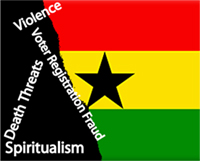The Dark Side of Ghana's Politics
Published on 27th October 2008

 |
| Ghana's Political dark side |
Some countries are disciplined that there appears to be no dark side to their democratic system. In Canada, in the just ended October 14 parliamentary elections, no dark side of the electoral system was reported, either with regard to voter registration fraud, attack on candidates, insults, threats, incitements for disorder or juju-marabouts and other spiritualists darkening the political system.
But, in Ghana, as sparks from the ongoing electioneering campaigns indicate, things are different, and events can be darker. The Ghanaian socio-culture also influences its electoral practices. This is informed by the behaviour of some of its politicians, a few of whom talk misguidedly, and certain cultural values.Osabarima Antwi Agyei V, Chief of Okadjakrom, requested politicians to shun campaign of “insults, acrimony, ethnocentrism and violence to preserve Ghana’s peace, unity and stability.” When the convoy of the increasingly popular Nana Akufo, the presidential candidate for the ruling New Patriotic Party (NPP), was attacked last week in Accra, it was the highest point of the dark side of the Ghanaian politics. And so was it when political clashes erupted between the NPP and the main opposition National Democratic Congress in the North and other parts of Ghana. When a mentally challenged teenage boy was ritually killed in Accra recently, Ghanaians read to it as politically motivated in the heated run up to the December 7 general election. This is the dark side of politics influenced by certain aspects of the culture.
The political darkness can be more scary if figures like ex-President Jerry Rawlings lapses, as he occasionally does, and rolls out his explosive incitements, threats, harassment and other dreadful experiences Ghanaians have gone through in 51 years of Ghana’s corporate existence.
The Ghanaian democracy may be toddler, and politicians and civil society still learning its nuances, but Ghana’s emerging democrats, convinced beyond all reasonable doubt that democracy is the best vehicle for sustainable development, unlike the gratuitous 21 years of military juntas are working to contain the dark side of Ghana’s democracy.
In Osabarima Agyei, reflecting how traditional rulers and institutions are nurturing and guiding the 16-year-old democracy in Botswana, more enlightenment to deal with the dark side of politics are constantly being preached. Against the milieu of dark politics, Osabarima Agyei charged politicians to “educate and explain issues, their policies and programmes to solve the country’s socio-economic and political problems to enable the electorate vote for them.”
